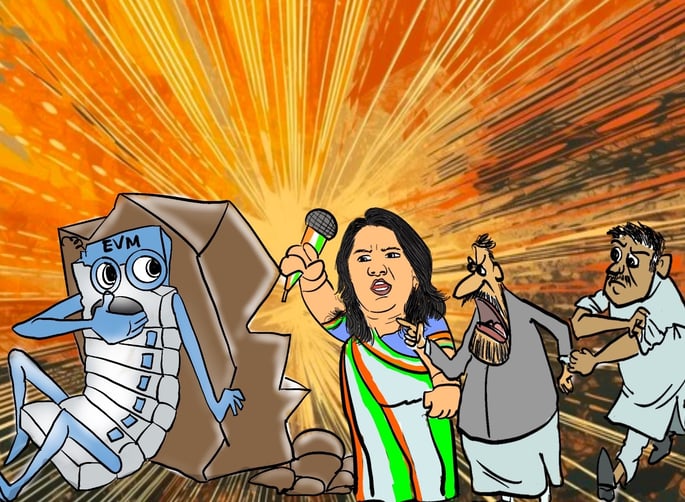Exploring the Complexities of India's 2023 Assembly Election: Unveiling the EVM Debate and Electoral Results.
EVM Controversy, Electoral Dynamics, and Political Turbulence Unveiled. Delve into the aftermath of BJP's triumph, the EVM debate sparked by Opposition claims, and the intricate electoral shifts shaping India's political landscape. Uncover the contrasting viewpoints, regional nuances, and the evolving discourse around electronic voting systems.
MARTAND PRATAP SINGH
12/5/20232 min read


India’s political landscape has once again been stirred by the outcomes of the recent assembly elections. The BJP's landslide victories in Madhya Pradesh, Rajasthan, and Chhattisgarh have not only secured its dominance in the Hindi heartland but have also fueled a contentious debate regarding the reliability of Electronic Voting Machines (EVMs).
The aftermath of the elections saw a flurry of accusations and skepticism surrounding the EVMs, particularly from Opposition leaders. Congress's defeat led some of its prominent members to question the integrity of the voting machines. Digvijaya Singh and Kamal Nath expressed concerns about alleged anomalies in EVMs, citing charged machines and unexpected voting patterns as evidence of tampering.
Singh's remark about any machine with a chip being hackable intensified the debate. However, these allegations faced strong rebuttals, notably from Union Minister Giriraj Singh, dismissing them as post-defeat excuses and highlighting the absence of similar complaints when the Congress secured victories in other states.
Even within the Congress ranks, opinions diverged. While figures like Singh and Nath cast doubt on the EVMs, Karti Chidambaram reaffirmed his confidence in the machines, emphasizing the need for internal consensus within the party.
The contrasting electoral fortunes of parties across different states further underline the complexity of this election. The Indian National Congress (INC), for instance, witnessed a remarkable surge in Telangana but faced significant setbacks in Madhya Pradesh, Rajasthan, and Chhattisgarh.
Comparing the INC's performance from 2014 to 2023 reveals intriguing dynamics. Despite a growth in vote share and seats, the party faced a setback in certain key states. Simultaneously, the Bharath Rashtra Samithi (BRS), which experienced a remarkable rise in 2018, encountered a drastic decline in vote share and seats in the recent elections.
This variance in outcomes adds layers to the ongoing debates about electoral processes, the impact of regional factors, and the interpretation of voters' preferences.
The call for a return to ballot paper elections, echoed by some leaders like Akhilesh Yadav, further intensifies the discourse. Drawing parallels with systems in countries like America and Japan, this viewpoint advocates for a meticulous vote counting process that ensures accuracy and transparency.
In essence, the 2023 assembly elections in India have not just shaped political landscapes but have also ignited debates around the efficacy and trustworthiness of the electoral mechanisms.
As the nation navigates through these outcomes and controversies, it's imperative to uphold the democratic essence by addressing concerns, fostering transparency, and ensuring an inclusive dialogue on the future of electoral processes.
The varying perspectives, electoral intricacies, and the evolving narrative surrounding EVMs collectively paint a multifaceted canvas of Indian politics, inviting deeper analysis and discourse.

CONTACT US!
Contacts
+917065700003
martand@thearambha.com
